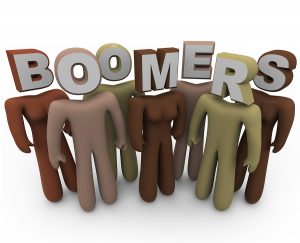Leaders Focus on People, Not Generations
 There is no denying that there are generations in our history. Also no denying that we have undergone huge social upheavals, especially in the last 100 years, that define those generations.
There is no denying that there are generations in our history. Also no denying that we have undergone huge social upheavals, especially in the last 100 years, that define those generations.
And certainly there is some benefit to being able to identify cultural impacts on a certain age group. It helps to understand perspective and reference base.
Culture Impacts Generations and Understanding
For example, every year Beloit College puts out what they call The Mindset List. For each year of incoming freshmen, they detail things the students have and have not experienced in their lifetime. It helps staff and faculty better understand where they are coming from. Some examples from this year’s list, the class of 2021, are:
- Students coming in this year were likely born in 1999.
- They are the last of the Millennial Generation
- They are the first generation for whom a “phone” has been primarily a video game, direction finder, electronic telegraph, and research library
- Zappos has always meant shoes on the Internet
- Bill Clinton has always been Hillary Clinton’s aging husband
- Justin Timberlake has always been a solo act
Things like that can be useful information. Things they have known to exist and what has ceased to exist. Knowing a little bit about perspective can be helpful and identifying generational data serves that purpose.
Dangerous Assumptions Based on Generations
Where we run into trouble is when we attach stereotypes to a generation. Trying to predict behaviors based on a generation leads to assumptions. And as a leader, making and acting upon assumptions can lead to dangerous consequences.
 I am a Baby Boomer, which in some eyes makes me old. In my defense, I am on the tail end of it.
I am a Baby Boomer, which in some eyes makes me old. In my defense, I am on the tail end of it.
By generational stereotyping I should be……..well, that’s the problem. In my research it was difficult to find any kind of consensus on what characteristics define a Boomer. By some accounts I am a workaholic, not very tech savvy, out to get mine, and very rules driven. By other accounts, I am simply looking forward to retirement, stay in one job for an extended period of time, and am independent and even revolutionary.
in truth, I am anything but a workaholic (actually I could probably use at least a little of that attitude). I consider myself very tech savvy (background as a technical trainer), but also very relationship-driven. Most would tell you I am not exactly known as a rules follower. Personally, I said no to retirement long ago. I have changed jobs often. I enjoy mentoring, adding value, and sharing fame and fortune. I’ll stop before it sounds too much like a dating profile.
But if you rely on the stereotypes, your treatment and expectations for me would certainly create conflict. I would most likely not behave or produce the way you envisioned. Which doesn’t mean I wouldn’t produce, just not necessarily the way you expected.
Millennials have the same issue.
Who Are Millennials?
 True to form, there is some variation in the time period for the Millennial Generation. Some say from 1982 to 2000; others say from 1980 to 1996. Bruce Tulgan, who authored the book Not Everyone Gets a Trophy, actually defines it in two waves – from 1978 to 1989 and then from 1990 to 2000.
True to form, there is some variation in the time period for the Millennial Generation. Some say from 1982 to 2000; others say from 1980 to 1996. Bruce Tulgan, who authored the book Not Everyone Gets a Trophy, actually defines it in two waves – from 1978 to 1989 and then from 1990 to 2000.
As a result, most Millennials in the workplace would roughly be between 18 and 37 years of age with the last remnants about to enter the workforce.
To discover the stereotypes of MIllennials, I performed a Google search starting with the words “Millennials are” and here are some of the words that appeared
- Lazy
- Entitled
- Selfish
- Disloyal
- Tech Savvy
- Need work to babysit them
Most M’s I know are far from lazy; if anything they are too busy. Entitlement is not the exclusive territory of M’s and is more cultural than generational in my opinion. Again, very general statements that stereotype an entire generation of people. And companies pay consultants thousands of dollars to learn how to engage with them.
Why the Stereotypes Don’t Work
Here is why relying on these assumptions about generations creates problems for a leader.
Very (Sometimes Extremely) Overgeneralized
As seen in the above list of Millennial stereotypes in order to create a “profile” means we often point to the extreme behaviors over the typical. Extreme behaviors stand out and are the ones most noticed. So when we find it necessary to try to predict behavior, we opt for the far side.
Highly Inaccurate
Generational Theory came about in 1923 by Karl Mannheim. Emphasis on theory. Mannheim himself even admits that there are wild variations in his theories about generations. Part of that is caused by location, heritage, and other factors. What we know about a Baby Boomer from Florida may be different than what is true about a Boomer in Montana.
Despite the empirical data surrounding Mannheim’s study, it is still just a theory and as yet to be proven as scientifically provable. However, like evolution, we have taken an unproven theory and made it science.
Arbitrary Classifications
The only one really well-defined is Baby Boomers, which is from 1946 to 1964. They were well-defined because statistically there was a huge increase in births during that time period; likely brought about by people returning from the war. World War One, Two, Korean War – pick one.
Other generations, even the ones preceding Boomers, have been somewhat randomly created to suit a purpose. For example, the generation leading up to 1946 is called The Greatest Generation. How did that term come about? Newsman Tom Brokaw coined it because it made a good book title. Actually, I’m sure he really felt that way. But the fact that it did sell a lot of books certainly doesn’t hurt. Realistically, it should be called the World War Generation because that’s the period that defines them the most.
Yet as noted before, there tends to be dissension over generation names and time periods for most of these generations. And most of the definitions appear to be entirely self-serving. If your book or product serves a specific segment, it’s good to have that segment be more inclusive.
What does understanding generations do to help you? How do you overcome the stereotypes?
Share your thoughts here or drop me a line at psimkins(at)BoldlyLead.com.
